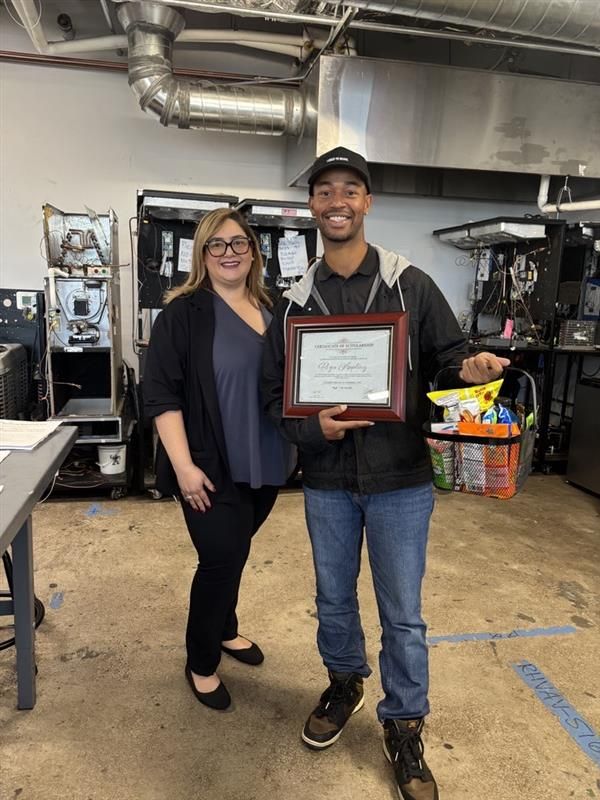Is HVAC Hard to Learn?
| Update: November 6, 2025
Working in the HVAC industry brings a new challenge every day and a new opportunity to work with your hands and solve complex problems. HVAC work requires plenty of technical knowledge and the ability to think critically, be flexible, and work independently.
The HVAC industry in the U.S. is seeing continued growth and strong demand. As of 2024, there were approximately 425,200 jobs in the HVAC industry or related field nationwide, according to the U.S. Bureau of Labor Statistics. The field is projected to grow 8% from 2024 to 2034, faster than average for all occupations.
If you are interested in these opportunities but have been asking yourself, "Is HVAC hard to learn?", this article is for you. With the right training from UEI College and some serious motivation, you could be prepared for an entry-level position in the HVAC field in as few as 10 months.
If you want to begin a new career in the HVAC field, you should consider enrolling in UEI College's Heating, Ventilation and Air Conditioning Program. The Heating, Ventilation and Air Conditioning Program is short-term, allowing you to begin a new career quickly.
Is HVAC Hard to Learn?
Although becoming an HVAC Technician may be challenging for some, it is not too difficult if you're motivated to learn and train. If you're good with your hands and can dedicate the time to study and learn HVAC principles, you will find training to become an HVAC technician quite achievable.
For many, HVAC training is not hard to complete. In fact, HVAC is no more difficult to learn than any other trade, but you should be prepared to learn in various ways.
Some people assume that because HVAC is very hands-on work, it's possible to learn just by taking a system apart and putting it back together again. However, HVAC work requires a lot of critical thinking and problem-solving, as well as knowledge of how air, gas, heat, and electricity all play a part in the system's function. Today, many systems depend on computers, so being tech-savvy is also a must.
For these reasons, it's important for an HVAC Technician to receive training that teaches a concept through pictures, videos, and lectures and then provides the opportunity to practice hands-on with real equipment.
What Do You Need to Know to Become an HVAC Tech?
In the course of an HVAC Program, you should be prepared to learn the following:
Basic Mathematics
HVAC Technicians need to be able to do some basic calculations to determine the amount of refrigerant to use in a system, translate a blueprint design, and understand the amount of electricity that a system needs. You don't have to be a mathematician, but you should feel comfortable with basic algebra.
Science
When you think about it, HVAC systems are very scientific. They use electricity to manipulate air and gas to provide very specific levels of cooling and heating. As a technician, you need to be able to understand the scientific laws that have gone into making these systems possible. Again, you do not have to be a brilliant scientist to work in HVAC. These concepts have been around for hundreds of years and have been built into the machines you will be working with. You need to have a basic understanding of the concepts to know how to help it all function properly.
If you have a high school education, these fundamentals of math and science have already been taught to you, and you probably have enough understanding to move forward with a training program.
In addition to math and science, an HVAC training program will teach you how to:
- Install, clean, inspect, troubleshoot, and repair HVAC systems
- Ensure proper connectivity to electrical sources
- Safely handle tools and equipment
- Use gas, electricity, heat, and oil within an HVAC system
- Repair, maintain, and install ductwork
- Repair and maintain refrigeration equipment
What Does a Typical Day in an HVAC Program Look Like?
A typical online learning day may consist of the following:
- Joining a live lecture led by an experienced instructor to explore a new topic, which allows students to ask questions and view examples before stepping into the lab
- Completing online assignments and discussion boards
- Quizzing yourself on topics learned
A Typical In-Person Day Consists of the Following:
- Reviewing online lecture content and providing more time for questions and answers
- Going into the lab to practice the concept with live equipment
- Completing in-person assignments to test these skills
- Reviewing the assignment and troubleshooting issues
UEI College offers ongoing enrollment, which means many classes consist of students who are just beginning their training and those who are nearing graduation. This allows students to learn from one another and improve their skills by sharing them cooperatively. Even experienced HVAC technicians know there is always something new to learn in this industry, so mastering learning from others is a huge benefit.
What Are Some Skills That HVAC Techs Should Have?
HVAC technicians work with people, tools, and technology. Their job changes daily and requires a wide variety of both technical and soft skills. Some technical skills HVAC technicians should have or should learn during a training program include:
- Safety protocols
- Reading blueprints
- Cleaning filters
- Basic plumbing
- Basic electrical and wiring
- Testing equipment
- Preventative maintenance
- Hand and power tool experience
- Reviewing the assignment and trouble
Soft skills that someone considering a career in HVAC should have include:
- Professionalism (customer service)
- Problem-solving
- Punctuality (time management)
- Motivated
- Effective communication
These skills can all be gained over time with consistent practice. A school setting is the best place to practice these skills, and you may find additional skills that help further your career.
How to Become an HVAC Tech?
As mentioned above, there are two paths to becoming an HVAC technician, but the most reliable path is by training through a vocational college like UEI College. To learn more about the exact process of becoming an HVAC technician, read How to Become an HVAC Technician.
Enroll in UEI College To Become an HVAC Technician
If you're ready to take the next step but still have questions about how to get started in HVAC or what your training experience will look like, UEI College can help you explore your options and get enrolled quickly. UEI College has the right mix of support and resources to help you start your journey toward a career in HVAC. You can complete your training and be prepared for an entry-level position in as few as 10 months.
Contact us for more information about UEI College's HVAC Program to begin training for a new career in the HVAC field. Find a campus near you now.





